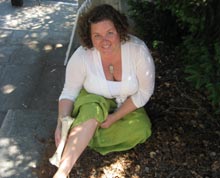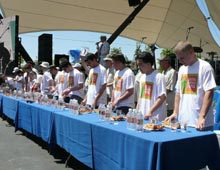Sharyn Hall

Habitus is the acquired expression of personal taste in art, dialect, comportment, zip code, literature, entertainment, etc. established by the wealthy (unconsciously) as a means to set themselves apart from the working class. Yet mere expression of habitus by the lower economic strata changes their social class (Bourdieu, 1976). The Protestant Work Ethic (PWE) is best captured by the colloquialism pull yourself up by your bootstraps and is the belief that anyone can achieve wealth and success if s/he is willing to do the hard work. Notwithstanding, the social cues […]
Jordan Kevin Jeffery

T.S. Eliot, James Joyce, and Ezra Pound, the three pillars of Modernism are bound in their use of allusions, an attempt to tie their works to those of the past. One particular element that finds itself repeatedly invoked in the works of these Modernists is the figure of the Theban soothsayer Tiresias. I hope to identify the importance Tiresias plays as character and formative reference in each of the texts. My research will focus on a close reading of these three texts, the classical texts they draw on, and literary […]
Shannon Swan

The Caucasus Mountains acted as a gateway for early hominids, who migrated into and through these regions, perhaps multiple times. Myshtulagty Lagat (Weasel Cave) is the first intact stratified cave studied in the Caucasus dating from 500,000 years BP to the Holocene. The cave lacks a well-stratified early upper Paleolithic sequence (c. 40.000-30.000 years ago, associated usually with our own species, Homo sapiens sapiens). Tracking Neanderthal climatic adaptations through faunal analysis allows for reconstruction of behavioral and dietary changes providing data imperative to interpreting site use and formation processes. Connections […]
Omomah Abebe
Leslie Lang
Irene Chemtai Mungo
This summer, I am interested in understanding and highlighting how a local community in Mombasa, a small coastal town in Kenya is responding to the HIV/AIDS threat that is facing its members. I want to understand the role that community support groups, gatherings, church meetings, and community celebrations such as skits and dances are playing in molding dialogue about HIV/AIDS. With an understanding of the historical role of organizing in traditional African communities, this project will study how organizing and dialogue is playing a part in the education and empowering […]
Caroline Akiko Yamamoto
The Sannai Maruyama site, located in Aomori Prefecture, Japan, is currently considered to be the largest Jomon Period settlement in Japan. While ongoing excavations have significantly contributed to our understanding of Jomon hunter-gatherer lifeways, there is still much to learn about Sannai Maruyamas functionality. My research will focus on analyzing the charred seed remains gathered from soil samples collected during an excavation of a Middle Jomon pit-dwelling this summer. This will allow for a preliminary assessment of the pit-dwellings functions, depositional sequences, and activity areas. More importantly, a comparison of […]
Samma Ishaq
My particular interest for this summer is to explore whether the ongoing violence in Kashmir have inspired women to lead movements or organize petitions against the government in the last decade. I wish to study specific examples of resistance that have been attempted in the past, and to analyze the types of initiatives organized particularly by females, who seldom receive any acknowledgement for their efforts. Women in Kashmir are generally written into history as submissive and marginalized figures, who due to their social suffering, cannot bring themselves to oppose either […]
Itamar Haritan

I am interested in the personal and political transformations that occur at the beginning and throughout the process of mobilization for social change. In particular, I am interested in the activities of the Jerusalem Open House, a grassroots organization that is the politically active community center of the LGTBQ community in Jerusalem, a city deeply divided along various lines where even close daily contact does not translate into mutual understanding between different communities. By volunteering and interviewing individuals in the Open House, I hope to understand the personal-political transformations that […]
Adrienne Johnson

Competitive eating is a vernacular form of cultural criticism masquerading as mass entertainment. My research into the significance of competitive eating in American culture will unveil collective but inarticulated perspectives on consumerism, gender roles and our economic climate. Competitive eating is at once a glorification of American excess and an indictment of it; a direct challenge to idealized human form and a confirmation of its strength. Historically, I believe competitive eating served to homogenize immigrant diet in 19th century America. By tracking the foodstuffs of competition, I hope to prove […]